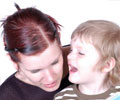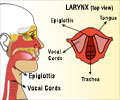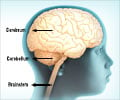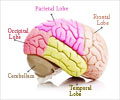Types of Aphasia
There are different types of aphasia depending on the area of the brain involved. These include the following:
Broca’s aphasia or Motor Aphasia
In Broca’s aphasia, the Broca’s area and the surrounding areas of the brain are affected. The patient shows the following features:
- The patient does not speak fluently. His sentences are short and lack grammar. He can understand and read, however he cannot name, repeat, or write correctly.
- He is aware that he cannot speak correctly, hence he could be depressed.
- He may suffer from paralysis as well.
- He may take months to years to recover.
Wernike’s aphasia or Receptive Aphasia
Wernike’s aphasia occurs when the Wernike’s area and the surrounding areas are affected. The patient shows the following features -
- The patient speaks fluently and extensively, but the content lacks meaning. He may make up some new words as well. He has difficulty understanding language. He may not name or repeat correctly. He may not be able to read and write accurately.
- He does not realize that he does not speak correctly, hence he gets frustrated wondering why people cannot understand him.
- The patient does not suffer from paralysis. He may suffer from visual defects.
- He may recover completely or may worsen.
Global aphasia or Total Aphasia
In global aphasia, a large part of the brain is affected to include both Wernike’s and Broca’s areas (i.e both sensory and motor speech cetres of the brain). The patient shows the following features –
- All aspects of language are either partially or totally affected. The patient cannot understand and express words or sentences, repeat, read or write.
- He is often depressed.
- The patient may also have paralysis and visual defects.
- Recovery depends on the extent of damage.
Conduction aphasia
In conduction aphasia, the nerves that connecting the sensory and motor speech centres i.e. the Wernike and Broca’s area are affected. Hence the signal cannot pass from one area to the other. The patient shows the following features:
- The patient speaks fluently but may not be able to express well.
- The patient can understand written language well but cannot repeat correctly.
- He also cannot name and write accurately.
Other types of aphasia include:
Transcortical aphasia
In transcortical aphasia, the nerves connecting different speech areas are affected. However, the Wernike and Broca’s areas are spared.
Transcortical aphasia may be:
- Motor - Symptoms are similar to Broca’s aphasia.
- Sensory – Symptoms are similar to Wernike’s aphasia.
- Mixed – Symptoms are a combination of the above two conditions. It is also called Isolation aphasia.
Repetition is intact in transcortical aphasia.
Anomic aphasia
In anomic aphasia, any portion of the left brain may be affected.
- Naming, word finding, and spelling are affected.
- The patient can usually understand and repeat correctly and is fluent, however the speech may lack content.
Pure word deafness
In this kind of aphasia, words that are heard are not relayed to the language areas. Hence patient shows the following symptoms:
- He cannot understand spoken words. However, he can speak without any difficulty.
- The patient improves if he learns lip-reading.
Pure alexia without Agraphia / Pure word blindness
The posterior part of the brain that has the visual centers is affected. The patient suffers from the following symptoms -
- He cannot understand written words since the visual signals from written words cannot reach the language network. He may also be unable to name colors. He can otherwise understand, name, and write.
Alexia with agraphia
The patient shows the following features:
- The patient is unable to read and write, which he was able to do earlier.
- He speaks fluently but may use inappropriate words.
Aphemia
The patient shows following features:
- Fluency of speech is lost suddenly, though other functions are intact.
- The patient recovers completely.
Primary progressive aphasia
It arises due to degenerative changes in the language areas of the brain. The patient shows the following symptoms:
- The patient is unable to name objects. He may be unable to express his thoughts, find the correct words or understand. He often makes grammatical and spelling mistakes.
- Language may or may not be fluent.
- The patient usually worsens with time.















